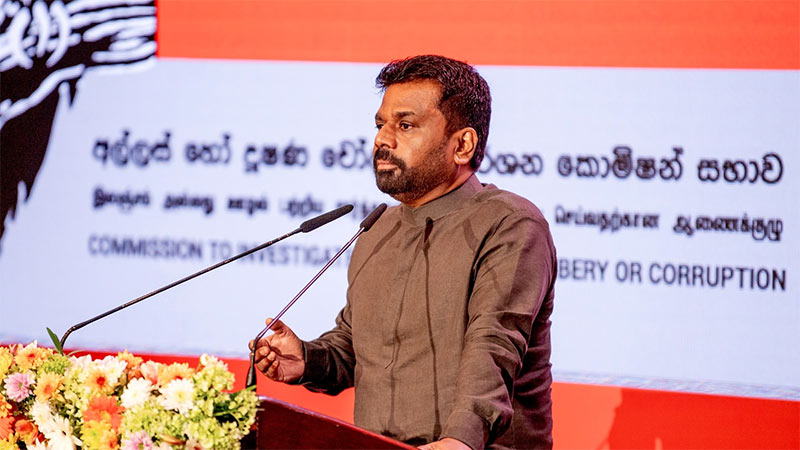Sri Lanka launches bold anti-corruption drive

Sri Lankan President Anura Kumara Dissanayake today (April 9) declared that the government has taken firm steps to remove political interference from the fight against bribery and corruption, placing the responsibility squarely on the public service to follow suit or face consequences.
Speaking at the launch of the National Anti-Corruption Action Plan 2025–2029 at the Bandaranaike Memorial International Conference Hall (BMICH) in Colombo, the President made it clear that the grace period for state officials to align with the new direction is over. He warned that from May 2025, the government will take strict legal action against officials who continue to resist reform.
“Since taking office, we have ensured that politicians are no longer part of this problem. Now, it’s up to the state machinery to act accordingly. If not, we will take firm legal steps,” he said.
The President emphasized that corruption has weakened the country’s institutions and values. While no section of the public service has been allowed to collapse under his leadership, he warned that continued resistance to change would lead to the removal and replacement of non-compliant officials.
Highlighting the long-term damage caused by corruption, he stated, “This is not political revenge, it’s a moral duty. We must build a society that respects the law and fears wrongdoing. Workshops alone are not enough; people must see that those who break the law are punished.”
President Dissanayake pointed out that corruption in Sri Lanka ranges from small bribes at the village level to massive financial crimes, including the looting of the Central Bank. He said previous governments protected corrupt individuals, allowing criminal networks to thrive even within institutions tasked with upholding the law.
“These networks, some involving underworld figures, have already been identified,” he said. “We will dismantle them.”
He pledged that the responsibility to eliminate corruption would not be passed to the next generation. “We will resolve it in this generation, under this government.”
Drawing a contrast with India— which gained independence a year before Sri Lanka and now leads in space exploration and software development— he blamed decades of poor leadership for Sri Lanka’s 2022 bankruptcy. He said the current administration is committed to reversing this trend by implementing a national policy that ensures transparency and accountability for every rupee spent.
The President said the new Anti-Corruption Action Plan is aimed at turning Sri Lanka into a nation of integrity. As part of this, Internal Affairs Units will be established in all state institutions, including the Presidential Secretariat, and monitored through digital systems to ensure transparency.
The plan focuses on four key strategic areas:
- Prevention and public participation
- Institutional strengthening
- Enforcement of the law
- Legal and policy reforms
He identified the Commission to Investigate Allegations of Bribery or Corruption (CIABOC) as the lead agency in the anti-corruption effort, adding that a strong, cross-sector national policy is essential to build a corruption-free society.
CIABOC developed the plan with input from a wide range of stakeholders. Public consultations were held nationwide, including a survey on corruption that gathered views from parliamentarians, judges, officials, the private sector, civil society, media, youth, religious leaders, and people with special needs. The process also considered international best practices.
The President said the goal is to create a transparent public service, a supportive political will, a strong legal framework, and a public determined to end corruption.
International Support
Speaking at the event, Japanese Ambassador Hideaki Mizukoshi said corruption remains a major global challenge, weakening public trust and deterring investment. He noted, however, that reforms by the current government are already reviving investor confidence in Sri Lanka.
“Japan believes transparency and good governance are key to sustainable economic growth and has supported anti-corruption efforts worldwide for over a decade,” he said.
UNDP Resident Representative Azusa Kubota shared findings from Sri Lanka’s first National Taxpayer Perception Survey, which revealed that 84% of respondents felt corruption discouraged them from paying taxes.
She highlighted the wider impact of corruption, stating that it costs developing countries around USD 1.3 trillion annually, hampers sustainable development, and increases the cost of doing business. Referring to the President’s recent Budget Speech, she said, “The State must be accountable for every cent. This Action Plan is a roadmap to transforming society.”
The event was attended by:
- Chief Justice, Supreme Court Justice Murdu Nirupa Bidushinie Fernando
- Attorney General Parinda Ranasinghe PC
- Secretary to the President, Dr. Nandika Sanath Kumanayake
- CIABOC Chairman, former High Court Judge Neil Iddawela
- CIABOC Director General, R.S.A. Dissanayake
- Tri-Forces Commanders
- Inspector General of Police
- Senior security force officials
- A large number of state officials

Latest Headlines in Sri Lanka
- SriLankan Airlines CEO Richard Nuttall appointed President of Philippine Airlines April 25, 2025
- Suspect in Middeniya triple murder arrested in India and brought to Sri Lanka April 25, 2025
- Depot Managers given deadline to improve SLTB services April 25, 2025
- Clean Sri Lanka joins hands with ‘Siri Dalada Vandanawa’ April 25, 2025
- Sri Lankan President visits Vatican Embassy to mourn Pope Francis April 24, 2025



I trust proposed Anti-corruption action plan is an integral part of president’s Clean SL plan!
I went to the local Post Office yesterday to buy a Rs 200 postage stamp
The person at the counter said that Rs 200 stamps had run out in the counter; she could bring some for the store room at the back, but it would take 2 hrs for the forms to be completed and for the Postmaster to sign. She advised me to come in 2 days’ time.
As I needed the stamp urgently, I pleaded with the counter person; she ruffled some records/books on the desk and said she had some old Rs 200 stamps, which she could sell for Rs 400.
Does HE President Kumara’s plan cover this behaviour from workers who voted the JVP/NPP into Govt?